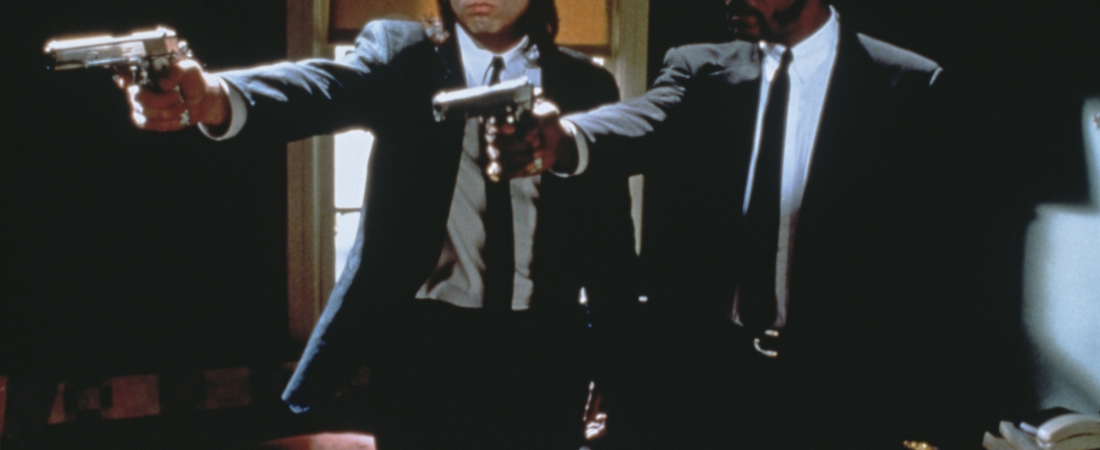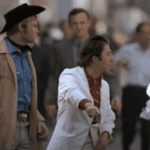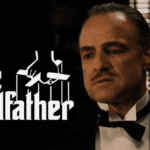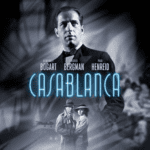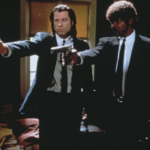Introduction to Pulp Fiction and Its Iconic Moments
Quentin Tarantino’s film Pulp Fiction, released in 1994, is a landmark in modern cinema, renowned for its bold storytelling and unique narrative structure. The film intertwines several seemingly unrelated storylines that converge in unexpected ways, creating an intricate tapestry of characters and events that captivates audiences. Each thread in the narrative is compelling, showcasing Tarantino’s skill in blending humor, violence, and profound themes. This innovative approach to storytelling marked a pivotal shift in how films were constructed and perceived.
Set in Los Angeles, the film dives deep into the lives of hitmen, mobsters, and small-time crooks. One of the most memorable characters, Jules Winnfield, portrayed by Samuel L. Jackson, delivers a powerful and philosophical monologue that brings depth to the film. His performance, along with the film’s eclectic ensemble cast, has left an indelible mark on cinematic history. Thus, Pulp Fiction is not only notable for its gripping dialogue and memorable characters but also for its substantial impact on pop culture.
The cultural significance of Pulp Fiction can be traced through its numerous references in other media, its influence on directors and writers, and its place in film studies curricula. The film garnered critical acclaim, winning the prestigious Palme d’Or at the Cannes Film Festival and receiving multiple Academy Award nominations, solidifying its status as a classic. Its ability to resonate with diverse audiences through its complex themes and rich character development fosters ongoing discussions among cinephiles, ensuring its relevance in contemporary film discourse.
As we delve deeper into Tarantino’s work, the exploration of iconic moments, such as the impactful Ezekiel 25:17 speech, will further highlight why Pulp Fiction continues to captivate viewers.
Although the Ezekiel quote is the most memorable section of this scene there are also a host of other quotes that stick in the memory forever and are just as memorable.
When Jules interrupts Brett by shooting an associate on the couch and turns and says “Oh I’m sorry did I break your concentration”
And who can forget “The Say What Sequence” which in spite of the high drama unfolding brings a tense engrossed smile to your face “say what again, say what again, I dare ya, I double dare ya mother****er” absolute classic movie quotes.
Don’t worry all the quotes from that scene are in the video link below. Enjoy!
Context of Jules’ Character and the Ezekiel 25:17 Quote
In Quentin Tarantino’s “Pulp Fiction,” the character Jules Winnfield, played by Samuel L. Jackson, serves as a compelling lens through which themes of morality and redemption are explored. Jules is introduced as a hitman, a role that inherently imbues him with a sense of detachment and ruthlessness. However, his character arc unveils a profound philosophical transformation that occurs during the film, particularly surrounding the iconic delivery of the Ezekiel 25:17 quote. This passage, often misquoted and repurposed for dramatic effect, provides critical insight into Jules’ evolving mindset.
Initially, Jules exudes an air of confident authority, using the quote to intimidate his victims. It is a mechanical recitation, devoid of genuine reflection on its meaning. However, as the story progresses, an encounter with a group of characters during a pivotal moment leads Jules to reevaluate his life choices. This incident acts as a catalyst for introspection, prompting him to confront the violence that has defined his existence. The brutal reality of his profession weighs heavily on him, leading to an existential crisis that prompts profound self-reflection.
The delivery of the Ezekiel 25:17 quote symbolizes this transition, encapsulating his shift from a man who invokes biblical rhetoric to assert power, to one who seeks deeper understanding and possibly redemption. By the climax of the narrative, Jules recognizes that the words he once wielded as weapons can also serve as vehicles for change. This significant moment not only serves to highlight the gravity of his transformation but also prompts the audience to consider broader themes of forgiveness, choice, and the moral ramifications of one’s actions. Thus, Jules’ journey and the context surrounding the Ezekiel 25:17 quote contribute significantly to the film’s exploration of redemption and the dualities of human nature.
The Full Ezekiel 25:17 Speech: A Closer Look
In Quentin Tarantino’s iconic film Pulp Fiction, the character Jules Winnfield delivers a memorable monologue that has captured the attention of audiences and critics alike. The full text of this speech serves as a pivotal moment within the film, showcasing both character depth and thematic complexity. The speech begins with a striking proclamation: “The path of the righteous man is beset on all sides by the inequities of the selfish and the tyranny of evil men.” This powerful opening sets the stage for a reflective journey through the moral landscape of the narrative.
As Jules continues, he speaks of the righteous and the wicked, illustrating the stark dichotomy between good and evil. He utilizes vivid imagery and poetic language that evoke the gravity of biblical themes. Phrases such as “blessed is he who, in the name of charity and good will, shepherds the weak through the valley of darkness” not only convey a sense of justice but also highlight Jules’ internal conflict and evolving character. The juxtaposition of ‘righteousness’ and ‘evil’ underscores the moral ambiguity that permeates Pulp Fiction, inviting viewers to consider their interpretations of right and wrong.
Moreover, Tarantino’s adaptation of the biblical passage enhances its emotional weight. The speech culminates in a moment of self-reflection, where Jules confronts his own life choices. This transformation is emblematic of broader themes within the film, such as redemption and the search for meaning. By positioning this speech at a critical juncture, Tarantino effectively utilizes it as a character development tool while also anchoring the overall moral framework of the narrative. The language employed, rich with metaphors and symbolism, offers profound insights into Jules’ character arc and the philosophical questions raised throughout Pulp Fiction.
Impact and Legacy of the Ezekiel 25:17 Speech
The Ezekiel 25:17 speech delivered by Jules Winnfield, a character in Quentin Tarantino’s “Pulp Fiction,” has transcended its cinematic origins to become a cultural touchstone with a profound legacy. This iconic moment not only showcases the character’s complex evolution throughout the film but also encapsulates core themes of justice, vengeance, and redemption. The speech serves as a reflection of Jules’ moral awakening, ultimately contributing to his character’s journey and creating a lasting resonance with audiences.
Since its release, the Ezekiel 25:17 passage has been referenced and parodied across diverse media, from television shows to advertisements. Its powerful language and dramatic delivery have rendered it memorable, allowing it to seep into the very fabric of popular culture. Fans often cite the speech for its philosophical implications, interpreting it through various lenses that highlight notions of righteousness and the consequences of one’s actions. This multidimensionality contributes to Jules’ legacy and positions the speech as a subject of discussion in film studies and critical analyses.
The themes present in the Ezekiel 25:17 speech—namely justice and redemption—hold considerable relevance beyond the film, prompting audience engagement and contemplation on moral choices and their ramifications. As viewers grapple with the speech’s underlying messages, they often draw parallels to contemporary societal issues, further extending its impact. The powerful dichotomy of vengeance versus forgiveness portrayed in the speech opens a dialogue about the human condition, prompting individuals to reflect on their values and decisions.
In conclusion, the Ezekiel 25:17 speech has left an indelible mark on pop culture, shaping how audiences perceive not only Jules Winnfield but also broader themes in storytelling. Its memorable lines have populated the lexicon of film references, ensuring that this pivotal moment continues to be celebrated and dissected years after its inception. It has also left an indelible mark on Samuel L Jackson who said he is asked to recite the speech “at least 3 times a day!”
The Full Jules Ezekiel 25:17 Pulp Fiction Quote
JULES
Ezekiel 25:17. “The path of the righteous man is beset on all sides by the
Inequities of the selfish and the tyranny of evil men. Blessed is he who, in
The name of charity and good will, shepherds the weak through the valley of
Darkness, for he is truly his brother’s keeper and the finder of lost
Children. And I will strike down upon thee with great vengeance and furious
Anger those who attempt to poison and destroy my brothers. And you will know
My name is the Lord when I lay my vengeance upon thee.”
More Movie Quotes To Inspire You
- Why So Serious? – The Dark Knight
 Introduction to The Dark Knight and The Joker Ever wondered why a movie quote haunts us even years after its release? The Dark Knight offers lines so impactful they’ve etched themselves into pop culture, with none more famous than the Joker’s taunting query, “Why so serious?” Introduction to this cinematic marvel is almost unnecessary, but… Read more: Why So Serious? – The Dark Knight
Introduction to The Dark Knight and The Joker Ever wondered why a movie quote haunts us even years after its release? The Dark Knight offers lines so impactful they’ve etched themselves into pop culture, with none more famous than the Joker’s taunting query, “Why so serious?” Introduction to this cinematic marvel is almost unnecessary, but… Read more: Why So Serious? – The Dark Knight - “I’m Walking Here, I’m Walking Here” – Midnight Cowboy
 Ever feel like the world might just run you over if you don’t stand your ground? Imagine navigating the chaotic streets of NYC in the ’60s. Sounds intense, right? Well, that’s exactly what happens in the iconic scene from Midnight Cowboy where Dustin Hoffman’s character boldly claims his turf with ‘I’m walking here!’ What’s even… Read more: “I’m Walking Here, I’m Walking Here” – Midnight Cowboy
Ever feel like the world might just run you over if you don’t stand your ground? Imagine navigating the chaotic streets of NYC in the ’60s. Sounds intense, right? Well, that’s exactly what happens in the iconic scene from Midnight Cowboy where Dustin Hoffman’s character boldly claims his turf with ‘I’m walking here!’ What’s even… Read more: “I’m Walking Here, I’m Walking Here” – Midnight Cowboy - “I Love the Smell of Napalm in the Morning” – Apocalypse Now
 Imagine waking up at dawn, surrounded by thick jungle, the air heavy with tension. Then, boom! The unmistakable scent of sweeping devastation—napalm. It’s chaotic, surreal, and strangely, some say it’s beautiful. Sounds wild, right? That’s war in Apocalypse Now, friends. Ready to dive into the psyche behind one of cinema’s most enduring lines? It’s more… Read more: “I Love the Smell of Napalm in the Morning” – Apocalypse Now
Imagine waking up at dawn, surrounded by thick jungle, the air heavy with tension. Then, boom! The unmistakable scent of sweeping devastation—napalm. It’s chaotic, surreal, and strangely, some say it’s beautiful. Sounds wild, right? That’s war in Apocalypse Now, friends. Ready to dive into the psyche behind one of cinema’s most enduring lines? It’s more… Read more: “I Love the Smell of Napalm in the Morning” – Apocalypse Now - May The Force Be With You – Star Wars
 “May the Force Be With You” – An Iconic Star Wars Quote One of the most recognizable phrases in cinema history, “May the Force be with you,” has become synonymous with the Star Wars franchise. This simple yet powerful line encapsulates the essence of hope, guidance, and the struggle between good and evil. Recognised by The American Film Institute… Read more: May The Force Be With You – Star Wars
“May the Force Be With You” – An Iconic Star Wars Quote One of the most recognizable phrases in cinema history, “May the Force be with you,” has become synonymous with the Star Wars franchise. This simple yet powerful line encapsulates the essence of hope, guidance, and the struggle between good and evil. Recognised by The American Film Institute… Read more: May The Force Be With You – Star Wars - You Talkin’ To Me? – Taxi Driver – Robert De Niro
 Think you know movie quotes? Hold on tight because “You talkin’ to me?” might just be the most enigmatic of them all. Dive into a world where one phrase encapsulates societal angst and alienation with gripping intensity. Travis Bickle, played by the legendary Robert De Niro, interrogates not just his surroundings but his very existence.… Read more: You Talkin’ To Me? – Taxi Driver – Robert De Niro
Think you know movie quotes? Hold on tight because “You talkin’ to me?” might just be the most enigmatic of them all. Dive into a world where one phrase encapsulates societal angst and alienation with gripping intensity. Travis Bickle, played by the legendary Robert De Niro, interrogates not just his surroundings but his very existence.… Read more: You Talkin’ To Me? – Taxi Driver – Robert De Niro - “These Are Not the Droids You Are Looking For” – A Star Wars Quote
 Few movie quotes have transcended time and become as iconic as Obi-Wan Kenobi’s famous line, “These are not the droids you are looking for.” This phrase, uttered in Star Wars: Episode IV – A New Hope (1977), has cemented itself in pop culture history. Beyond its significance in the movie, the line has evolved into a metaphor for persuasion,… Read more: “These Are Not the Droids You Are Looking For” – A Star Wars Quote
Few movie quotes have transcended time and become as iconic as Obi-Wan Kenobi’s famous line, “These are not the droids you are looking for.” This phrase, uttered in Star Wars: Episode IV – A New Hope (1977), has cemented itself in pop culture history. Beyond its significance in the movie, the line has evolved into a metaphor for persuasion,… Read more: “These Are Not the Droids You Are Looking For” – A Star Wars Quote - Don’t Cross The Streams – Ghostbusters
 In the pantheon of movie quotes that have wormed their way into our collective consciousness, few have the staying power of “Don’t Cross The Streams” from the 1984 supernatural comedy classic, Ghostbusters. This seemingly innocuous phrase, uttered with deadpan seriousness by Harold Ramis’s Dr. Egon Spengler, has become more than just a line from a… Read more: Don’t Cross The Streams – Ghostbusters
In the pantheon of movie quotes that have wormed their way into our collective consciousness, few have the staying power of “Don’t Cross The Streams” from the 1984 supernatural comedy classic, Ghostbusters. This seemingly innocuous phrase, uttered with deadpan seriousness by Harold Ramis’s Dr. Egon Spengler, has become more than just a line from a… Read more: Don’t Cross The Streams – Ghostbusters - “I”m Gonna Make Him An Offer He Can’t Refuse” – The Godfather
 “I’m Gonna Make Him an Offer He Can’t Refuse” – The Godfather’s Timeless Quote and Its Cultural Legacy Few movie quotes in cinematic history have achieved the legendary status of “I’m gonna make him an offer he can’t refuse.” Uttered by Marlon Brando as Don Vito Corleone in The Godfather (1972), this line is more than just a clever… Read more: “I”m Gonna Make Him An Offer He Can’t Refuse” – The Godfather
“I’m Gonna Make Him an Offer He Can’t Refuse” – The Godfather’s Timeless Quote and Its Cultural Legacy Few movie quotes in cinematic history have achieved the legendary status of “I’m gonna make him an offer he can’t refuse.” Uttered by Marlon Brando as Don Vito Corleone in The Godfather (1972), this line is more than just a clever… Read more: “I”m Gonna Make Him An Offer He Can’t Refuse” – The Godfather - Frankly My Dear I Don’t Give A Damn – Gone With The Wind
 “Frankly, My Dear, I Don’t Give a Damn”: An Enduring Movie Quote and Its Cultural Impact Few movie quotes in cinematic history have stood the test of time like Rhett Butler’s famous line, “Frankly, my dear, I don’t give a damn,” from the 1939 classic Gone With the Wind. Delivered with cool indifference by Clark Gable in his… Read more: Frankly My Dear I Don’t Give A Damn – Gone With The Wind
“Frankly, My Dear, I Don’t Give a Damn”: An Enduring Movie Quote and Its Cultural Impact Few movie quotes in cinematic history have stood the test of time like Rhett Butler’s famous line, “Frankly, my dear, I don’t give a damn,” from the 1939 classic Gone With the Wind. Delivered with cool indifference by Clark Gable in his… Read more: Frankly My Dear I Don’t Give A Damn – Gone With The Wind - Dirty Harry – Go Ahead Make My Day – Sudden Impact
 The ‘Dirty Harry’ franchise, a cornerstone of American cinema, has captivated audiences since its inception in the early 1970s. This series primarily revolves around the resolute and gritty San Francisco police inspector, Harry Callahan, masterfully portrayed by Clint Eastwood. Callahan’s character is emblematic of a tough, no-nonsense cop wielding a .44 Magnum, known for his… Read more: Dirty Harry – Go Ahead Make My Day – Sudden Impact
The ‘Dirty Harry’ franchise, a cornerstone of American cinema, has captivated audiences since its inception in the early 1970s. This series primarily revolves around the resolute and gritty San Francisco police inspector, Harry Callahan, masterfully portrayed by Clint Eastwood. Callahan’s character is emblematic of a tough, no-nonsense cop wielding a .44 Magnum, known for his… Read more: Dirty Harry – Go Ahead Make My Day – Sudden Impact - Greed Is Good – Wall Street Movie Quote
 Released in 1987, the film Wall Street, directed by Oliver Stone, stands as a significant narrative within the landscape of American cinema, reflecting the zeitgeist of the era. Set against the backdrop of the bustling financial district of New York City, the film delves into the moral quandaries faced by those entrenched in the world… Read more: Greed Is Good – Wall Street Movie Quote
Released in 1987, the film Wall Street, directed by Oliver Stone, stands as a significant narrative within the landscape of American cinema, reflecting the zeitgeist of the era. Set against the backdrop of the bustling financial district of New York City, the film delves into the moral quandaries faced by those entrenched in the world… Read more: Greed Is Good – Wall Street Movie Quote - Casablanca Famous Movie Quotes
 Released in 1942, “Casablanca” remains one of the most critically acclaimed films in cinematic history. Directed by Michael Curtiz, the film stars iconic actors such as Humphrey Bogart and Ingrid Bergman, whose performances have captivated audiences for decades. Set against the backdrop of World War II, “Casablanca” combines elements of romance, sacrifice, and patriotism, making… Read more: Casablanca Famous Movie Quotes
Released in 1942, “Casablanca” remains one of the most critically acclaimed films in cinematic history. Directed by Michael Curtiz, the film stars iconic actors such as Humphrey Bogart and Ingrid Bergman, whose performances have captivated audiences for decades. Set against the backdrop of World War II, “Casablanca” combines elements of romance, sacrifice, and patriotism, making… Read more: Casablanca Famous Movie Quotes - Dirty Harry – Do You Feel Lucky Punk?
 The Dirty Harry film series, which began with the release of the first film in 1971, has become a significant cultural phenomenon in American cinema. Centered around the character of Harry Callahan, portrayed with remarkable intensity by Clint Eastwood, the series has captivated audiences with its exploration of complex themes such as justice, morality, and… Read more: Dirty Harry – Do You Feel Lucky Punk?
The Dirty Harry film series, which began with the release of the first film in 1971, has become a significant cultural phenomenon in American cinema. Centered around the character of Harry Callahan, portrayed with remarkable intensity by Clint Eastwood, the series has captivated audiences with its exploration of complex themes such as justice, morality, and… Read more: Dirty Harry – Do You Feel Lucky Punk? - Ezekiel 25:17 Pulp Fiction – Jules (Samuel L Jackson)
 Introduction to Pulp Fiction and Its Iconic Moments Quentin Tarantino’s film Pulp Fiction, released in 1994, is a landmark in modern cinema, renowned for its bold storytelling and unique narrative structure. The film intertwines several seemingly unrelated storylines that converge in unexpected ways, creating an intricate tapestry of characters and events that captivates audiences. Each… Read more: Ezekiel 25:17 Pulp Fiction – Jules (Samuel L Jackson)
Introduction to Pulp Fiction and Its Iconic Moments Quentin Tarantino’s film Pulp Fiction, released in 1994, is a landmark in modern cinema, renowned for its bold storytelling and unique narrative structure. The film intertwines several seemingly unrelated storylines that converge in unexpected ways, creating an intricate tapestry of characters and events that captivates audiences. Each… Read more: Ezekiel 25:17 Pulp Fiction – Jules (Samuel L Jackson) - You Can’t Handle The Truth – A Few Good Men
 A Few Good Men, a courtroom drama film, was released in 1992 and directed by Rob Reiner. The film is adapted from a play of the same name by Aaron Sorkin, who also penned the screenplay. It features a distinguished cast including Tom Cruise, Demi Moore, and Jack Nicholson, whose performances were pivotal in bringing… Read more: You Can’t Handle The Truth – A Few Good Men
A Few Good Men, a courtroom drama film, was released in 1992 and directed by Rob Reiner. The film is adapted from a play of the same name by Aaron Sorkin, who also penned the screenplay. It features a distinguished cast including Tom Cruise, Demi Moore, and Jack Nicholson, whose performances were pivotal in bringing… Read more: You Can’t Handle The Truth – A Few Good Men - Show Me The Money – Jerry Maguire
 The Origin of ‘Show Me the Money’ The phrase “Show Me The Money” originates from the 1996 film “Jerry Maguire,” directed by Cameron Crowe. Within the context of the movie, Jerry Maguire, portrayed by Tom Cruise, is a sports agent facing a career crisis. After experiencing a moral awakening, he strives to promote a more… Read more: Show Me The Money – Jerry Maguire
The Origin of ‘Show Me the Money’ The phrase “Show Me The Money” originates from the 1996 film “Jerry Maguire,” directed by Cameron Crowe. Within the context of the movie, Jerry Maguire, portrayed by Tom Cruise, is a sports agent facing a career crisis. After experiencing a moral awakening, he strives to promote a more… Read more: Show Me The Money – Jerry Maguire

